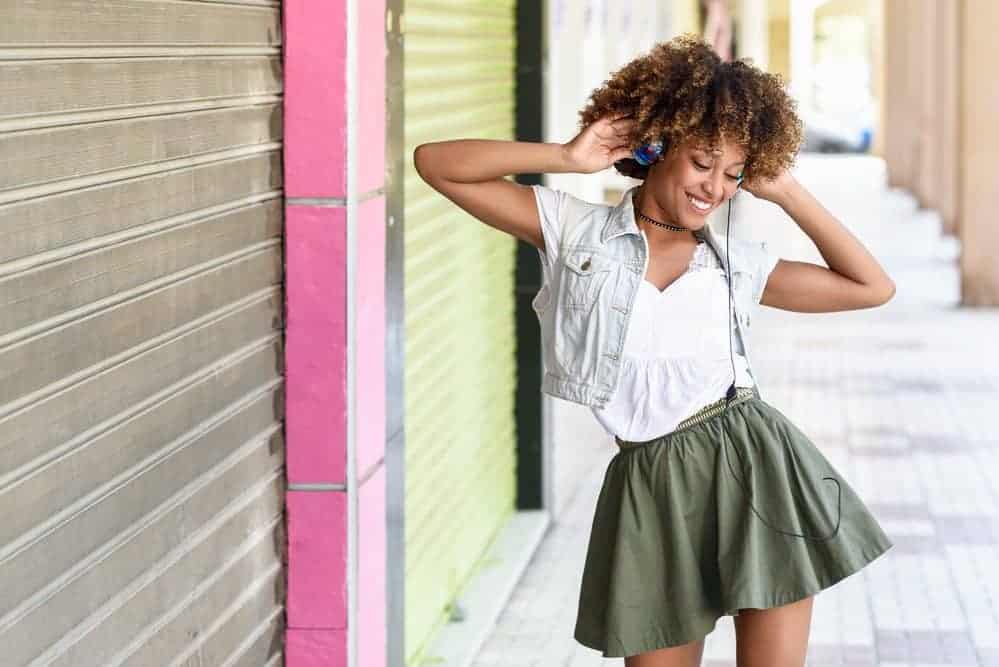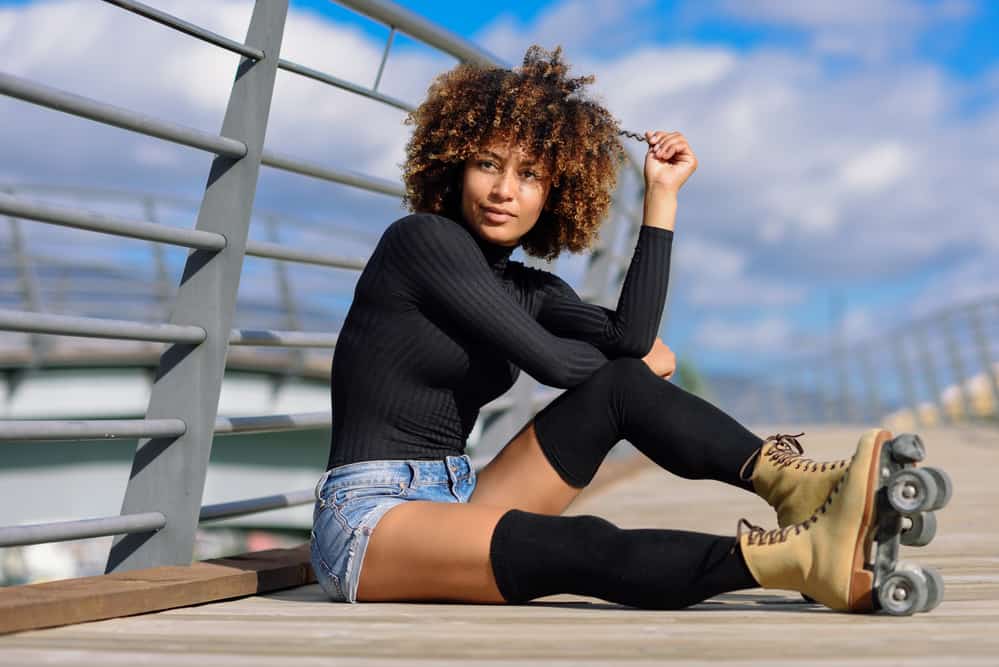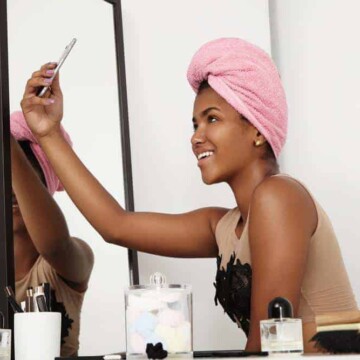
How often should you wash your hair?
It's completely up to you. There is no right or wrong answer to this question.
However, there is research that suggests that straight hair should be washed more often than wavy hair, curly hair, and kinky hair.
Straight hair requires more frequent washing and tends to look more oily, as sebum easily and quickly coats straighter hair strands.
Wavy, curly, and kinky hair types tend to stay a bit drier than straight hair, as it's more difficult for oils to travel down curlier hair types.
Some researchers believe that this is one of the primary reasons that curly hair doesn't need to be washed as often because curly girls rarely have oily hair.
Note that over-washing your hair leads to unnecessary manipulation, increasing the chances that you'll encounter breakage and potentially hair loss (source).
This is especially true if you're using harsh shampoos or if you consistently wear hairstyles that pull at the roots of your hair or stress your edges.
Table of Contents
- 1 How Often Should You Wash Your Hair?
- 2 Should You No-Poo or Shampoo Your Hair?
- 3 Does Co-Washing Really Work?
- 4 How Does Shampoo Work?
- 5 ...But, Are Sulfate-Free Shampoos Better for Your Hair and Scalp?
- 6 Are Sulfate-Free Shampoos Gentle?
- 7 What's the Difference Between Sodium Laureth Sulfate (SLS) and Sodium Lauryl Ether Sulfate (SLES)?
- 8 Using Natural Shampoo Alternatives
- 9 Basic Shampoo Ingredient Formulations and Primary Functions for Washing Your Curly Hair Type
How Often Should You Wash Your Hair?
We recommend washing your hair no more than every other day and as little as once per week for curly hair. Washing curly hair too often could be very drying, depending on the ingredients in the shampoo.
Co-washing your hair or using the Curly Girl Method are options to consider if you want to try a washing routine specifically designed for curly girls.
For people with a kinky hair type (often referred to as type 4), we recommend washing your hair once per week. Note that the American Academy of Dermatology provides a similar recommendation.
For people with straight hair, washing your hair every two to three days is generally acceptable. However, if your hair is greasy, itchy, or dirty, it's time to shampoo.
We recommend washing your hair less than once a week if you've had chemical treatments like perms or relaxers. Otherwise, you might see an increase in dryness, hair breakage, split ends, and porosity issues.
Ultimately, there is no blanket recommendation, and paying attention to your hair's needs is important to determine how often you should wash it. How often you should wash your hair depends on several factors, such as hair type, lifestyle, and scalp condition.
Should You No-Poo or Shampoo Your Hair?
Some women in the natural hair community use a co-washing technique to clean their hair. This concept of co-washing, also known as conditioner washing, involves washing your hair using a conditioner instead of a traditional detergent-based shampoo.
When I mention a traditional detergent-based shampoo, I am talking about commercial shampoos, which include sodium lauryl sulfate (SLS), SLS-free brands, shampoo bars, castile soap, and other types of soap.

Does Co-Washing Really Work?
Shampoos are usually used to remove dirt and oil from your hair. This dirt can be in the form of particles, lint, dust, and other substances which stick to the oils coating your hair strands.
However, a common complaint with shampoo is that it can make your hair feel dry. This is the primary reason why many naturals prefer to co-wash their hair. In theory, co-washing would never completely strip the hair of all of its natural oils, leading to less overall dryness.
Some women have even decided to wash their hair using only water. So, does water washing or conditioner washing adequately clean your hair and scalp?
Water Washing
Based on our research, water washing your hair tends to only spread the hair’s natural oil more evenly over your hair strands. However, water washing does not clean your hair or remove excess oils, meaning that the hair will still be dirty and unwashed.
Co-washing (Conditioner Washing)
Conditioner washing (co-washing) can surprisingly provide a decent level of cleanliness to your hair. This is because co-washing products can remove most of the oil coating of unwashed hair.
Even though some remnants of oil will be left on your hair, co-washing will remove about 90% of the visible oil layer, but does co-washing effectively clean your scalp?
In short, I don't think co-washing is effective at cleaning your scalp over a long period of time due to leftover oils and conditioner build-up. Note that this is my opinion, as I haven't found any studies that prove or disprove this theory.
So, if co-washing works well for your hair, we recommend continuing to use the hair care routine that works best for your hair.
Traditional Shampooing
Using commercial shampoos is the best way to clean your hair as it completely removes visible scalp oils and deposits on your hair. Although, the problem is that these shampoos can completely strip your hair of moisture leading to the feeling of dry hair, especially with frequent washing.
If you decide to exclusively co-wash your hair, the buildup of conditioner deposits on your hair can happen, and an occasional shampoo is important, even if you are committed to a co-washing regimen.
Shampooing is still the best way to clean your hair. Co-washing is an acceptable alternative, but periodic shampooing (or frequent shampooing, depending on your needs) is still recommended.
We don't recommend water washing due to the lack of effectiveness. We also don't recommend using dry shampoo unless you don't have another option at the moment.
We consider dry shampoos "temporary" solutions to be used in a pinch. For example, you're on vacation with an oily scalp and can't use your normal washing routine.

How Does Shampoo Work?
Are you familiar with the saying that oil and water don't mix?
This saying is more important than ever when it comes to understanding how shampoos work. Oil will always separate and float on top of the water.
Even if you are able to vigorously mix the oil and water, you will, at best, get droplets of oil within the water. Plus, if you allow the mixture to settle, the oil and water will once again separate.
Now, you may have noticed dish detergent is able to remove oils from dirty dishes. The reason is due to the dish detergent containing surfactants.
Surfactants are special chemicals that have (1) a polar head and (2) a lipid tail. The polar head loves water, and the lipid tail loves oil. Some surfactants, like sodium lauryl sulfate (SLS), are able to interact with both oil and water.
With surfactants like SLS, chemists can combine water and oil without them separating. This allows the oil to completely dissolve in water. This process occurs because the surfactants create micelles, a mixture of oil, water, and a surfactant.
Now that we understand micelles, let's discuss SLS.
In the natural hair community, SLS has a reputation for drying out your hair. It's often completely avoided by many women. However, there is a reason why it's often used in commercial shampoos. SLS is a fantastic surfactant.
Let's compare two scenarios to illustrate the purpose of SLS:
- If you decide to use a water washing regimen, washing your hair with only plain water, this process will dislodge some oil, but your hair will still be dirty.
- If you decide to use a shampoo with a surfactant (like SLS), the oil will be removed from your hair. This is because the surfactant will cause the water and oil to form micelles that are going to carry the oil away when the shampoo is rinsed out of your hair.
It's important to note that some women don't want squeaky clean hair; remember, that's one of the main reasons why so many women use co-washing instead of shampooing their hair daily.
Although, if you're trying to remove a silicone-based product and have excess conditioner or oil build-up on your hair and scalp, then you may find yourself using an SLS shampoo to give you fresh, clean hair.

...But, Are Sulfate-Free Shampoos Better for Your Hair and Scalp?
While there are no official classification parameters for sulfate-free shampoos, cosmetic companies usually classify their shampoos as sulfate-free when they don't contain ammonium lauryl sulfate (ALS), sodium lauryl sulfate (SLS), ammonium lauryl ether sulfate (ALES), and sodium lauryl ether sulfate (SLES).
Are Sulfate-Free Shampoos Gentle?
Several sulfate-free shampoos are gentle and aren't irritating to your hair, scalp, and skin. However, this is not always the case.

As such, you should always trust the way your hair and scalp feel after using a sulfate-free shampoo. It is important to note that many sulfate-free shampoos use an ingredient called olefin sulfonate.
Olefin sulfonate is often used in the place of SLS, which is a very effective surfactant that gets rid of oil very quickly.
Likewise, olefin sulfonate is pretty effective at removing hair oils, but it can be harsh and irritating to the scalp. In terms of irritation intensity, it's very comparable to the irritation expected from SLS.
A Society of Cosmetic Chemistry study found revealed excellent comparisons between the various shampoo surfactants used. The study reveals that olefin sulfonate is comparable with SLS, the most irritating surfactant.
This is despite olefin sulfonate being classified as a mild surfactant. On the other hand, SLES produces moderate reactions even when left on the skin for up to 5 days after washing. However, it is classified as a harsh sulfate.
However, not all sulfate and sulfate-free shampoo surfactants are harsh. Some are gentler than the sulfates. For example, sulfate-free sorbitol esters are much gentler.
What's the Difference Between Sodium Laureth Sulfate (SLS) and Sodium Lauryl Ether Sulfate (SLES)?
These ingredients are effectively the same, although one is gentler than the other. The phrase ‘eth’ (i.e., laureth) is a reference to ethoxylation, a process by which the SLS is converted to SLES.
Through ethoxylation, SLS is converted to the gentler SLES by adding more carbon atoms. By the end of the process, SLS, which has 12 carbon atoms, ends up having 14 to 16 carbon atoms (depending on the conversion process), which is SLES.
Using Natural Shampoo Alternatives

Bentonite Clay Wash
We don't typically recommend bentonite clay, but we've been pleasantly surprised with the effectiveness of the clay wash.
The cleanliness level provided by bentonite clay, which turns into a silky paste, seems to be similar to a co-wash. Most of the oil layer is removed, with only a few remnants of surface oil remaining.
Rhassoul Clay Wash
Rhassoul clay wash does not create a silky paste-like bentonite clay, but it appears to clean in a very similar way. The cleanliness of the hair appears to be similar to a typical co-washing session, where most of the surface-level oil has been removed.
Apple Cider Vinegar
Some naturals promote apple cider vinegar as a natural cleanser. We don't usually recommend using apple cider vinegar (ACV) as a standalone cleanser, but we do like some commercial shampoos that use ACV as a primary ingredient.
In our experience, ACV alone will only provide marginal cleanliness compared to co-washing or SLS-based shampoos.
Shikakai Shampoo
Shikakai shampoo is often recommended as an Ayurvedic shampoo for those with an affinity for natural products.
We only periodically mention Ayurvedic hair treatments, but my friend Phoenyx Austin tends to talk about these treatments more frequently.
Shikakai shampoo is produced using crushed acacia pods that contain saponins. The root of the Saponaria plant is commonly used in commercial soaps and shampoos.
In our experience, shikakai shampoo provides marginal results compared to co-washing or traditional commercial shampoos.
If you're interested in learning more about Ayurvedic hair care, we recommend reading Phoenyx's book, 'If You Love It, It Will Grow'.

Homemade Soaps, Natural Soaps, and Shampoo Bars
Traditional soaps, for example, if we make an olive oil soap with sodium hydroxide, produce pretty clean hair. However, homemade soaps are often not considered mild cleansers, and we recommend being cautious with hair products that have high pH levels.
Conceptually, we provide the same advice for users of castile soap and African black soap. If you use undiluted or less diluted castile soap you're likely to completely remove the oil layer.
So, depending on the formulation, homemade soaps, natural soaps, and shampoo bars can be very similar to traditional SLS-based commercial shampoos.
Baking Soda
Baking soda continues to be a pretty popular natural cleanser in the natural hair community, but in our experience, baking soda doesn't seem to clean the hair very well. The hair will often remain oily after multiple uses of baking soda.

Basic Shampoo Ingredient Formulations and Primary Functions for Washing Your Curly Hair Type
This section includes the most common formulations and ingredients in commercial shampoos (source).
Detergents
Detergents are designed to remove dirt from the hair and scalp. They also remove sebum, styling products, and skin scales.
Several detergents are included in cleansing products, but the most common ones are sodium laureth sulfate, sodium lauryl sulfate, sodium olefin sulfonate, ammonium lauryl sulfate, ammonium laureth sulfate, TEA-lauryl sulfate, and DEA-lauryl sulfate.
Foaming Agents
These foaming agents are included to cause commercial shampoos to form suds. Many people believe that foaming equates to cleanliness. However, this simply isn't true. Foaming and cleaning are completely unrelated.
Conditioners
Conditioners are what leave your hair feeling soft and smooth after the detergent has removed the dirt and oil from your hair and scalp.

Thickeners
Thickeners are responsible for increasing the thickness of a shampoo formulation. One common misconception is that thick shampoo is superior to thin shampoo. The thickness of the formulation doesn't affect the shampoo's performance.
Opacifiers
Opacifiers are used to make a shampoo opaque or a whitish, milky color. It is solely for aesthetic purposes and has no impact on the shampoo's performance on your hair.
Sequestering Agents
These agents prevent soap scum from forming on the scalp and within the hair while washing your hair with hard water. Sequestering agents are one of the primary differences between a bar cleanser and a liquid shampoo.
Fragrances
Scents (or fragrances) are added to make a shampoo smell good. If a fragrance wasn't used in shampoo, then it likely wouldn't smell good to consumers.
Preservatives
The last thing a consumer wants is for their shampoo to become contaminated. This is why preservatives are used in commercial shampoos. More specifically, preservatives are used to prevent fungal and microbial contamination of the shampoo.
Special Additives
These special additives are commonly referred to as treatment ingredients.
These additives, for example, include jojoba oil or amla oil, are also used as marketing aids to other benefits of the shampoo being sold, and are used as additions to the cleansing effects of the shampoo.
As for what kind of additives are used, this varies from one brand of shampoo to the next.
- How to Wash Your Hair and Not Get Your Face Wet?
- How to Wash Your Hair in the Sink by Yourself
- Do Black People Wash Their Hair?
- Are You Supposed to Wash Your Hair Before a Hair Appointment?
With straight, wavy, curly, and kinky hair types, plus everything in-between, everyone's hair is a little different. So, generally speaking, there is no way to provide an exact answer, but we do encourage women to wash their hair regularly to mitigate product buildup and encourage hair health.
How often you should wash your hair depends on your hair regimen, workout regimen, outdoor activities, the climate in your geographic regimen, scalp health, and much more.
For newbies, I recommend that you start out washing your hair once per week with lukewarm water. Determine how your hair feels, record it in your natural hair journal, and increase or decrease your washing frequency as needed.
Even after you settle on a wash routine, you will need to make adjustments as the needs of your hair may change based on your lifestyle changes.




